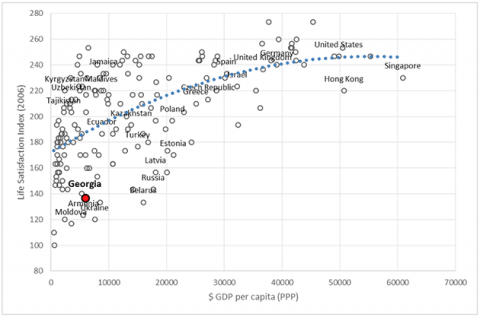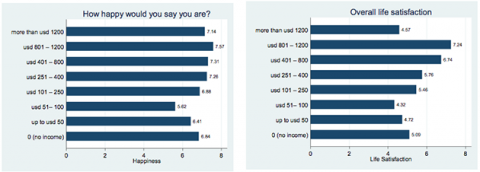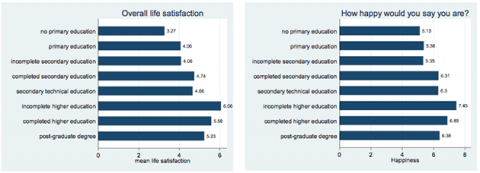 30
ივნისი
2022
30
ივნისი
2022
ISET ეკონომისტი
 სამშაბათი,
19
მარტი,
2013
სამშაბათი,
19
მარტი,
2013

The Kingdom of Bhutan is a very special country. When in 2004 King Wangchuck announced that there would be free elections and the kingdom would be gradually transformed into a democracy, people demonstrated in the streets against these reforms. They were so satisfied with their monarchy and their ruler that they tried to urge him not to give away any of his absolute powers to an elected parliament.
Also economically, Bhutan is special. It is the only country in the world that does not try to maximize the gross domestic product (GDP). Instead, King Wangchuk developed an index called “Gross National Happiness” (GNH) that aims to measure the well-being of the people directly, without taking the GDP as a proxy.
Typically, there are many adverse effects brought about through economic development – environmental pollution, social defragmentation of the society, inequality, egoism, and overreaching competition between people, to name just a few. All these negative impacts of economic growth are not taken into account by the traditional GDP.
Another problem is that the GDP measures all economic activity equally, regardless of its cause. When in 2011 a devastating Tsunami hit Japan, causing thousands of victims and leading to the Fukushima nuclear disaster, the real GDP went down by just 0.7%. A ridiculous number, given that arguably the greatest catastrophe in Japanese history since the detonations of atomic bombs in Hiroshima and Nagasaki had taken place.
The ideas of the Bhutanese King resonated in the economics discipline. In the last 15 years, a new subfield has emerged within economics, namely the “Economics of Happiness”. Driven by original thinkers like Bruno S. Frey from Switzerland, it was initially considered an exotic and not fully serious pursuit to elicit the connection between the economic situation of society and the “happiness” of its people. Yet if one thinks about it, the connection is rather natural: What, if not the happiness of a population, should be the ultimate goal of economics?
Economics was always concerned with the social welfare of societies and the utility of economic agents. Yet both concepts do not coincide with happiness. Social welfare is usually defined as the surplus which economic agents obtain through trading on markets, measured in terms of money. However, many things which make people happy are not traded on markets, so clearly this concept falls short of comprehensive happiness. Utility, on the other hand, is but a convenient way to model the preferences of people. A situation may be according to one’s preferences, but does that mean that one is happy? Again, the connection between happiness and utility is very loose.
In happiness economics, a variety of different methods were developed for quantitatively measuring well-being, quality of life, life satisfaction, and related concepts. Happiness economists claim that happiness, though being a subjective experience, can be objectively measured, assessed, and correlated with the characteristics of society. Sophisticated questionnaires play an important role. According to these researchers, asking people questions that elicit their happiness and life satisfaction offers important information about society and can signal the need for change.
A prominent happiness index is the New Economics Foundation's Happy Planet Index (HPI). In the year 2012, HPI ranked 151 countries across the globe. According to this index, Georgia is the 55th happiest nation, as happy as Armenia and happier than Russia, Turkey, and Azerbaijan. (To compare, Georgia was 71st place in 2009 by HPI).
Another attempt to quantify happiness was conducted by researchers at the Gallup World Poll. According to their data, collected from 2005 through 2009, Georgia did not do that well. It was just in place 115 among 155 countries, and less happy than any of its neighbors.
The Life Satisfaction Index (see chart) was created by Adrian G. White, an analytic social psychologist at the University of Leicester in England. According to this index (2006 ranking), Georgia is on the hardly flattering 169th place among 178 countries, happier than Armenia but less happy than all of its other neighbors.
While the economics of happiness can boast many counterintuitive results, there are also some expected outcomes. In spite of different approaches and different rankings, it is a robust finding in happiness studies that one of the most significant determinants of happiness is money. Life satisfaction is positively associated with income. Money does buy happiness—at least up to some income level.

The chart depicts the Life Satisfaction Index, but what can be seen here coincides with HPI or any other measure of happiness. Bluntly speaking, richer countries are happier countries.
However, richer countries are the more developed countries, and they are more often democracies with strong property rights and developed institutions. It turns out that a good deal of their happiness advantage comes from these factors. Bruno S. Frey found out that the elements of direct democracy (referenda etc.), which play an important role in Swiss political decision making, substantially contributed to the happiness of Swiss people.
Money has diminishing happiness returns. Satisfaction rises sharply in income for poor countries, yet for rich countries, more income does not yield huge happiness gains. Above $5000 monthly income, additional income has hardly any effect on happiness.
The Caucasus Research Resource Centers (CRRC) conducts an annual survey named Caucasus Barometer that includes questions about overall life satisfaction. Respondents rate their satisfaction on a one to ten scale (1 - not at all satisfied, 10 - completely satisfied). In 2011, CRRC interviewed about 2500 persons in Georgia. The results suggest that in Georgia, richer people are happier people. Respondents with a monthly personal income of USD 800-1200 report an average 7.24 level of satisfaction with life, compared to the much lower value of those who earn up to USD 100 (see chart below). Life satisfaction also increases not only due to higher personal income but is also significantly correlated with total family income. Age is negatively associated with life satisfaction, and younger Georgians are more satisfied with life compared to elderly people. Also, young people appear less negatively affected by having less money. The number of family members plays a significant role, larger families up to 7 members on average are happier, but this value decreases when families become even larger.

There is a positive correlation between happiness and the level of education. People with a higher level of education are happier than those with lower levels. According to CRRC’s Caucasus Barometer data, only 20% of respondents with incomplete secondary education (or lower) are satisfied with life (life satisfaction >=7), compared to 30% of those with higher education.

The growing happiness literature has shown that not only money matters. Age, education, size of family, democracy, and institutions are also highly important for happiness, and they gain significance the more developed a country becomes. Furthermore, it was shown that in low-income countries like Georgia people are less happy not only because they can afford less consumption, but also due to higher inequality, which is often perceived as unfair. For Georgian political decision-makers, these insights from happiness economics may be very valuable and should be taken seriously.





